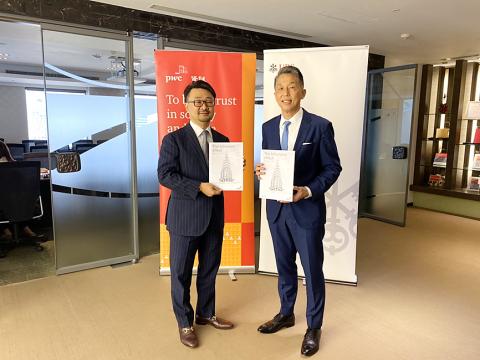Eleven people were added to the ranks of Taiwanese billionaires last year, while six dropped from the list, leaving a total of 40, a 14 percent rise from 2017, UBS Group AG and PricewaterhouseCoopers (PwC) said in a report yesterday.
Billionaires are defined as people who have more than US$1 billion in financial and non-financial assets, including property or shares in their own companies, or firms in which they have a stake of at least 20 percent, the report said.
The 11 newcomers, who had an average age of 73, have businesses that focus on retail, materials, real estate or finance, the local units of UBS and PwC told a news conference in Taipei, declining to reveal their names.

Photo: Allen Wu, Liberty Times
Among them, three were “self-made” billionaires, with the others inheriting firms or wealth, the report said.
The combined wealth of the 40 increased 1.3 percent annually to US$85.5 billion last year, with each billionaire contributing about US$2.1 billion, it said.
That bucked the global trend, as the combined fortunes of the world’s billionaires fell US$388 billion to US$8.5 trillion last year, retreating for the first time in three years, the report said.
Taiwanese billionaires’ wealth mainly comes from the real-estate, materials, and consumer and retail industries, due to the nation’s social-economic environment and policies, PwC Taiwan financial services leader Richard Watanabe (吳偉臺) said at the conference.
“Taiwan’s wealth scene remains largely unperturbed,” UBS Taiwan head of wealth management Dennis Chen (陳允懋) said.
However, the nation lacks an environment that makes wealth-generating unicorn start-ups, such as US-based Uber Technologies Inc, possible, Chen said.
With 16 of Taiwan’s billionaires aged over 70, an estimated US$29.8 billion is forecast to be passed on to their heirs over the next 20 years, he said.
The average age of Taiwan’s billionaires was 69, while the global average was 64, he said.
Taiwan’s billionaires remained predominantly male, with only one female, the report said.
Nevertheless, the number of female billionaires in the world has soared by 46 percent over past five years to 233, topping the 39 percent average growth rate of their male counterparts, Watanabe said.
The number of billionaires in the Asia-Pacific region last year decreased from 814 to 754, with most from China, while their combined wealth fell 8.03 percent year-on-year to US$2.41 trillion, the report said.
“Self-made female billionaires contributed more to wealth creation, as their wealth surged by 131 percent from 2013 to last year, while wealth among their multi-generational peers or heiresses increased by 14 percent in the same period,” the report said.
“This phenomenon is most visible in Asia, where 57 percent of female billionaires are self-made,” Watanabe said, adding that about 40 percent of them made their money in the consumer and retail industries.
The tech industry is catching up, increasing its turnout each year, Watanabe said.
“This holds particularly true for the US and North America in general compared with China, where the real-estate industry remained the top contributor to wealth,” he said.

To many, Tatu City on the outskirts of Nairobi looks like a success. The first city entirely built by a private company to be operational in east Africa, with about 25,000 people living and working there, it accounts for about two-thirds of all foreign investment in Kenya. Its low-tax status has attracted more than 100 businesses including Heineken, coffee brand Dormans, and the biggest call-center and cold-chain transport firms in the region. However, to some local politicians, Tatu City has looked more like a target for extortion. A parade of governors have demanded land worth millions of dollars in exchange

Hong Kong authorities ramped up sales of the local dollar as the greenback’s slide threatened the foreign-exchange peg. The Hong Kong Monetary Authority (HKMA) sold a record HK$60.5 billion (US$7.8 billion) of the city’s currency, according to an alert sent on its Bloomberg page yesterday in Asia, after it tested the upper end of its trading band. That added to the HK$56.1 billion of sales versus the greenback since Friday. The rapid intervention signals efforts from the city’s authorities to limit the local currency’s moves within its HK$7.75 to HK$7.85 per US dollar trading band. Heavy sales of the local dollar by

Taiwan Semiconductor Manufacturing Co’s (TSMC, 台積電) revenue jumped 48 percent last month, underscoring how electronics firms scrambled to acquire essential components before global tariffs took effect. The main chipmaker for Apple Inc and Nvidia Corp reported monthly sales of NT$349.6 billion (US$11.6 billion). That compares with the average analysts’ estimate for a 38 percent rise in second-quarter revenue. US President Donald Trump’s trade war is prompting economists to retool GDP forecasts worldwide, casting doubt over the outlook for everything from iPhone demand to computing and datacenter construction. However, TSMC — a barometer for global tech spending given its central role in the

The Financial Supervisory Commission (FSC) yesterday met with some of the nation’s largest insurance companies as a skyrocketing New Taiwan dollar piles pressure on their hundreds of billions of dollars in US bond investments. The commission has asked some life insurance firms, among the biggest Asian holders of US debt, to discuss how the rapidly strengthening NT dollar has impacted their operations, people familiar with the matter said. The meeting took place as the NT dollar jumped as much as 5 percent yesterday, its biggest intraday gain in more than three decades. The local currency surged as exporters rushed to